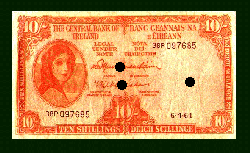Modern Irish Banknotes (1928 to date)
On this page: (click to jump down to these topics)
Before the inauguration of the Irish Free State on December, 6th 1922 six banks had the right to issue banknotes in Ireland. These six banks were named in the Bankers (Ireland) Act of 1845 and were:
As the newly established Irish Free State was still in the Sterling area these banks continued to issue notes both in the North and in the Free State areas as they had done prior to 1922.
The Belfast Banking Company sold its Free State business to the Royal Bank of Ireland in 1923.
In 1926 the Minister for Finance set up a banking commission to prepare a report on the changes necessary in banking and banknote issuing in the newly formed Irish Free State.
The result of the report was the establishment of an independant body called the Currency Commission which was to manage the newly created Irish Free State pound which was fixed to the Sterling pound.
The report also initiated the revocation of the right to issue notes from the five remaining banks from the 1845 Act and set up the Consolidated Bank Notes which would be issued to the existing five banks and three additional ones which were:
The Currency Act 1927 enacted the recommendations from the banking commission's report and established the Currency Commission. The Currency Commission was responsible for the issuing of the Legal Tender Notes and the production of the Consolidated Bank Notes. The eight banks which received the consolidated bank notes lost their right to issue notes of their own and were required to recall and destroy all existing notes. As some of these banks had business in the North of Ireland they had to produce a different issue of notes for the North following the issue of the consolidated notes as the previous notes which circulated in the entire island had to be withdrawn.
The first issue of Consolidated Bank Notes took place on May, 6 1929.
Six denominations were issued: £1, £5, £10, £20, £50 and £100.
Eight banks had notes produced and allocated to them for issue:
Select a bank for a short history of the Institution.
coming soon ...
The designs for the notes for all the banks were almost identical, differing only in the name of the bank and the signature. The obverse design of all of the notes was of a ploughman with a team of two horses hence the popular nickname of 'ploughman notes' for this series. The colour of the notes was the same as those chosen for the legal tender notes, the reverse design of each denomination was of a view of Ireland:
Select a denomination for an image of the note
coming soon ....
In 1934 another banking commission was set up which recommended the complete withdrawal of the right to issue notes from all the private banks in the state and the establishment of a Central Bank which would be responsible for all subsequent note issue.
The Consolidated Bank Notes continued to be issued until 1940. In 1954 with most of the notes already withdrawn from circulation the eight banks each paid the Central Bank a sum equivalent to their outstanding notes. The Central Bank of Ireland now carries the responsibility for redeeming these notes in exchange for Central Bank Notes.
The ploughman £1 and £5 and £10 notes are not particularly scarce, they are readily available to collectors from either banknote dealers or from public auctions. The notes from the different banks are of varying rarity, in particular the Northern and Ulster notes are difficult to find in uncirculated condition. The £5 and £10 notes from the banks with the smaller issues (Northern, Royal, Ulster and Hibernian) are scare.
Ploughman notes are very popular with collectors and notes in crisp Extremely Fine or Uncirculated condition are highly sought after and scarce.
Only one £20 pound note was reported as outstanding in 1954, and I believe that it has subsequently turned up in a collection. It is reportedly a Bank of Ireland issue, which is not surprising as the Bank of Ireland had the largest issue of notes. (I have since heard that the Bank of Ireland £20 notes are all accounted for so this story is clearly incorrect in detail).
The higher denominations; £50 and £100; were only produced for the Bank of Ireland, the Munster and Leinster Bank, The Royal Bank of Ireland and the Ulster Bank. All of the notes of these denominations were reported as withdrawn by the banks in the 1954 returns. No £50 or £100 notes have turned up subsequently and there are probably none left in existence unless they are still held within the vaults or archives of the relevent banks.
Specimen notes of the ploughman issue are available but extremely scarce. The £20, £50 and £100 specimens command very high prices when they appear on the market as these denominations are otherwise unavailable.
 1964 10 shilling note
1964 10 shilling note
The first issue of Legal Tender Notes took place on September, 10 1928.
The Legal Tender Notes were issued in seven denominations: 10s, £1, £5, £10, £20, £50, £100
Sorry !
I have not yet implemented the sections on :
© 1999 - Copyright John Stafford-Langan
johnsl at tinet.ie
Version 1.04 - 6 April 1999
1964 10 shilling note